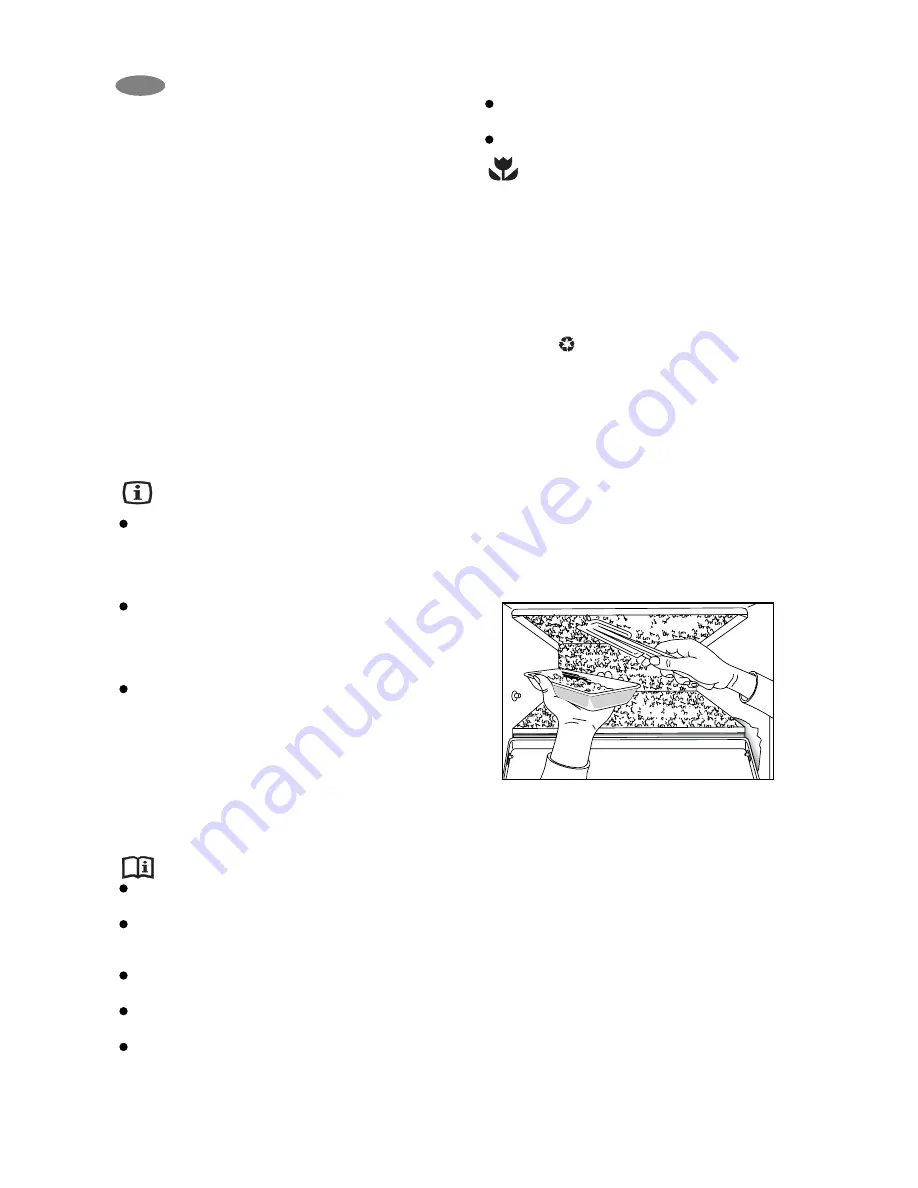
The freezing tray is suitable for freezing smaller fruits
(raspberry, strawberry, currant, etc.). Fruits should be
put on the tray in thin layers without packaging. After
freezing they can be packed and sorted out then
placed into the storing compartments.
Storing
It is practical to replace frozen products into the
storing compartments (cages) after freezing has
finished so that to make room in the freezing
compartment for another freezing.
Intermediate freezing does not deteriorate foods
already stored.
How to make ice cubes
To make ice cubes fill the enclosed ice cube tray with
water and put it to the frozen food compartment.
Wetting the bottom of the tray and setting
thermostatic control knob to maximum stage can
shorten preparing time. After finishing do not forget
to reset the thermostatic control to the suitable stage.
Ready ice cubes can be taken out of the tray under
running water then twist or hit it.
Some useful information and
advice
After opening and closing the door of freezer
vacuum will rise inside the appliance because of
the low temperature. So wait 2-3 minutes after
closing the door - if you want to open it again -
while inner pressure equalises.
Take care of operating the freezer at a position of
thermostatic control so that the inside
temperature can never go beyond -18 °C, since
temperature higher than this can deteriorate
frozen foods.
It is practical to make sure of faultless operation
of the appliance daily so as to notice possible
failure in time and prevent deterioration of frozen
foods.
Hints and ideas
In this chapter practical hints and ideas are given
about how to use the appliance to reach maximum
energy saving and there is environmental information
about the appliance as well.
How to save energy
Avoid putting the appliance in a sunny place and
near anything that gives off heat.
Be sure that the condenser and the compressor
are well ventilated. Do not cover the sections
where ventilation is.
Wrap products in tightly closing dishes or cling
film to avoid building up unnecessary frost.
Avoid products put in the freezer compartment to
touch foods already frozen.
Do not leave the door open longer than
necessary and avoid unnecessary openings.
Put warm foods into the appliance only when
they are at room temperature.
The condenser must be kept clean.
The appliance and environment
This appliance does not contain gasses which could
damage the ozone layer, in either its refrigerant
circuit or insulation materials. The appliance shall not
be discarded together with the urban refuse and
rubbish. Avoid damaging the cooling unit, especially
at the rear near the heat exchanger. Information on
your local disposal sites may be obtained from your
municipal authorities.
The materials used on this appliance marked with
the sympol
are recyclable.
Maintenance
Defrosting
Bleeding part of the moisture of cooling chamber in
form of frost and ice goes with the operation of the
appliance.
Thick frost and ice has an insulating effect, so it
reduces cooling efficiency as the temperature
increases, it needs more energy, at a certain
thickness it does not allow the door of the freezing
compartment to open, possibly the door can be
broken.
It is possible to scrape off and remove smaller frost
and ice with the enclosed ice scraper.
The tray in figure is not a piece of accessories to the
appliance!
When ice coating is so thick that it can not be
removed with the frost scraper defrosting is
necessary. Its frequency depends on usage.
How to defrost it:
Break the circuit of the appliance.
Take the frozen foods out of the appliance and put
them into a basket lined with paper or cloth. Store
them in a possibly cool place or replace them into a
frozen or fresh food compartment of a refrigerator.
Leave the door open.
Sweep off the melting water occasionally with a cloth
or sponge in direction of sides which gathers in the
outlet channel practically formed in the bottom of the
appliance and can be removed as follows:
34
GB
Summary of Contents for ZFT 12 JB
Page 11: ...38 SV Za 11 05 ...
Page 12: ...39 ...































